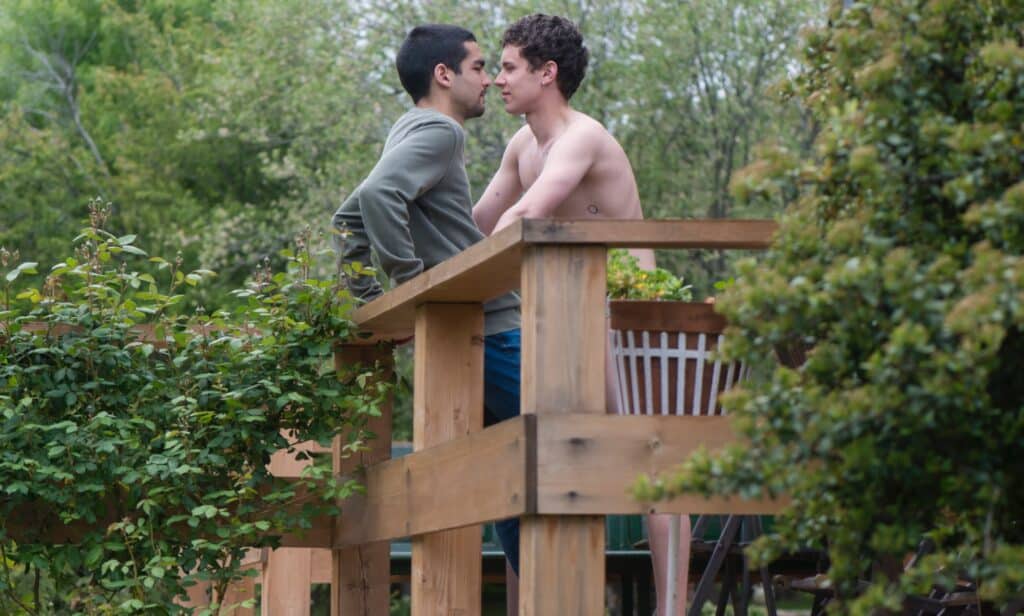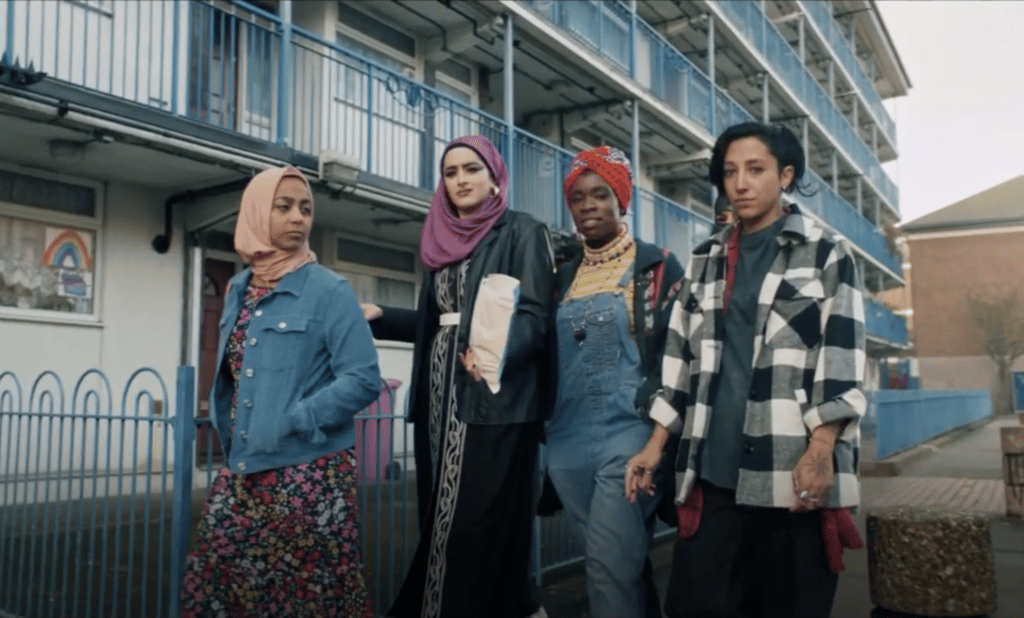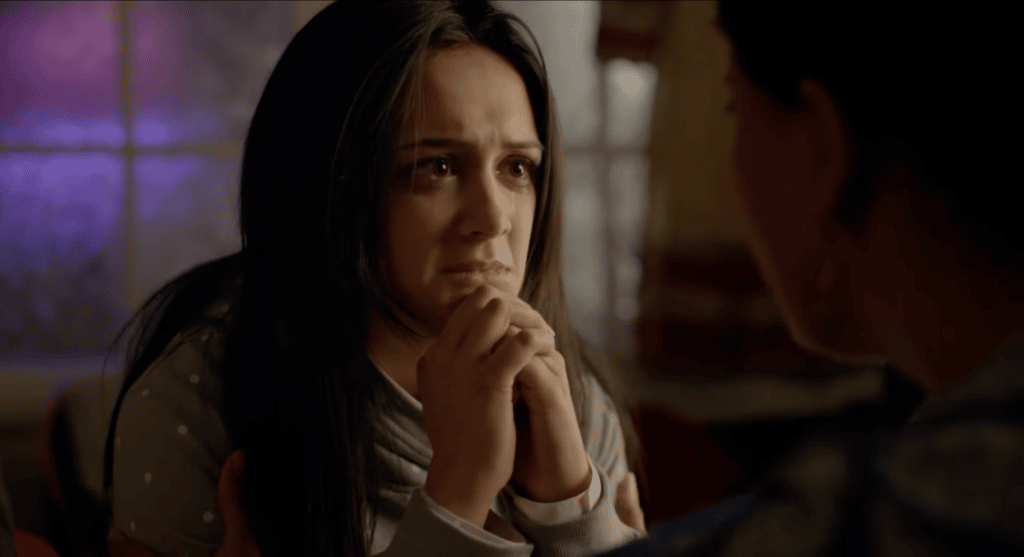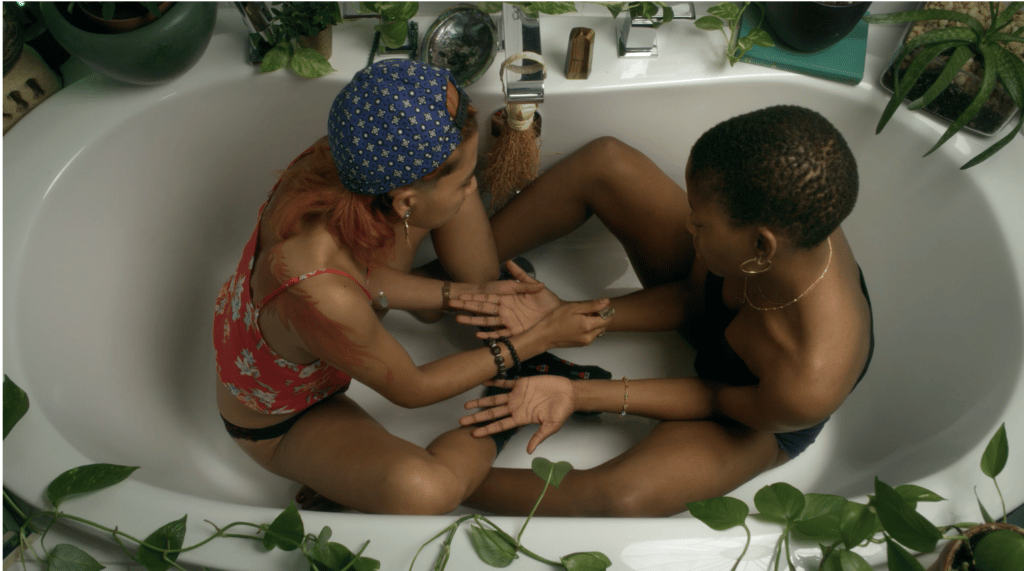LGBTQ+ Muslims deserve more than tokenism and nasty stereotypes: ‘Oppression isn’t our only identity’

There are more LGBTQ+ Muslims on screens than ever – but there’s still a way to go. (Getty/Netflix)
Over the past decade the arts industry, particularly film and television, has come a long way with creating content for and about LGBTQ+ Muslims.
Where before it was essentially non-existent, young queer Muslims can now see themselves in shows like Netflix’s Elite, Channel 4’s We Are Lady Parts and Ackley Bridge and Disney+ hit Love, Victor.
Despite this increase in nuanced storytelling on screen, LGBTQ+ Muslims, and Muslims across the board, are still facing huge challenges when it comes to positive representation.

Omar Ayuso in Elite. (Netflix)
Whether it’s still the sometimes questionable way Muslims are portrayed on screen – with nasty stereotypes penetrating popular culture – or the behind the scenes battles many Muslims still face, true representation has not been achieved.
“A huge reason why it took me so long to get into the arts space was because I felt there was no space for an LGBTQ+ Muslim,” says Furgie, a non-binary queer Muslim.
Furgie has dabbled across the industry, from writing and directing to gaming. In the past year they’ve focused on breaking into the acting industry.
“All I kept seeing were roles that were stereotypically negative Muslim depictions and I still to this day refuse to participate in those roles,” Furgie adds.
“I don’t want people from my community to feel what I’ve always felt which is that unless you play the terrorist, there is no other role for you, I want to break that chain.”
Animator and trans woman, Malaalei Rehman, agrees that the UK in particular still has work it needs to do to encourage diverse stories.
She pointed to British Muslim actors such as Riz Ahmed and Shazad Latif who have both headed to the US for work opportunities.
“While very recently stuff has been getting better, by and large, there are still very few roles being given to minority folk,” she explains.
When it comes to queer representation, while shows like Eastenders and Doctor Who have introduced LGBTQ+ Muslim characters, “there’s no real normalistation of it”, says Malaalei.

We Are Lady Parts features Ayesha – a lesbian Muslim. (Channel 4)
This is especially true when it comes to trans and non-binary characters.
“We don’t exist in the media landscape,” she says.
Rehman has worked in the animation industry for almost half a decade and thinks “there’s a little more leeway to show that kind of stuff”.
In her independent work, even before she realised she was transgender, she was penning stories about characters who felt “ill-fitting to their body”.
“Nowadays I make trans girls fighting systemic injustice from a more explicitly trans Muslim experience,” she says.
Within visual novels and animation, there have also been positive strides. “Even in big productions, you’re seeing Muslim people being presented in the background a lot more, and even as major characters in something like Glitch Techs and Dead End Paranormal Park,” Rehman explains.
Rehman has previously tried to get a novel published, but after seeing the woeful lack of Muslim voices within the industry has since given up. Although there are smaller publishing houses such as The Good Literary Agency which platform marginalised voices, there are still many barriers.
“One publisher came to the writing society I was a part of,” Rehman remembers, “and she was a Muslim lady who made her own publishing house because nobody would publish Muslim voices.
“She was very clear about the decline of the publishing industry. It was at that point that I basically gave up on the idea of getting published.”

Nas about to come out to her mother in Ackley Bridge. (YouTube/Channel 4)
Furgie has had similarly conflicting experiences while trying to enter the acting industry. “Being a queer Muslim in the arts industry welcomes a barrage of intrusive questions that you feel like you have to answer,” they say.
“I’m both a mystical unicorn that people are awed by, find courageous, want to ask questions and also unwanted in the industry where no one wants to give you a chance, to hire you, to tell your stories, to mentor you – it’s a very weird combination.”
For others, art has been an escape where they can be their true selves, but this has not come without its downsides.
Nash, a non-binary lesbian artist living in Bahrain, explains: “To people outside the internet, I’m just a regular hijabi with a desk job.”
They no longer identify as Muslim but living in a Muslim country with Muslim friends has shaped their relationship with their medium.
“The online art industry can be unkind, especially if you are interested in producing political work or anything trans positive. I have encountered Islamophobia from both fascists and queer people.
“I had right-wingers calling me ‘s**tskin’ and telling me to jump off a building.”
Despite the negative experiences, the online art scene has also been a safe space for Nash.
“It’s been kinder to me. Especially the queer side of it. I’m open about my upbringing and I feel that’s what drives some to support me.”
Living in Bahrain, Nash believes LGBTQ+ people living in the West still have some way to go in their understanding of the rest of the LGBTQ+ community.
“Non-western queer artists exist,” they say, “I wish there was more awareness raised about people like me. Some of us rely on our art to escape and we’re more than our religion and oppressive governments. Oppression isn’t our only identity.”

Noor and Layla – Fawzia Mirza’s short film about queer Muslims during Ramadan. (Frameline Voices/Baby Daal Productions)
Canadian Pakistani Muslim writer and director Fawzia Mirza summed up the feelings of many speaking to the New York Times in 2019.
“A call to action is to not just create and populate the world with queer Muslim best friends but recognise that part of how we change that narrative is to make the queer Muslim the loudest voice in the show and whose story we’re telling from the beginning, from their perspective with their life, their family and their struggles.”
Rehman builds on this, saying: “Hiring practices that don’t discriminate are all well and good, but they’re pointless if people don’t know why they’re doing it, or don’t understand what they’re losing by not doing it. What we actually need is a ground up educational program.”
This is especially needed for trans Muslims, who Rehman thinks are “on the ground floor working up.”
Furgie agrees: “Hire more queer Muslims, give them more opportunities, mentor them, fund their stories, ask them directly what they need and want and give it to them.
“I feel like the industry just doesn’t reach out and talk to queer Muslims and if they do reach out, it feels like our stories are being taken from us and given to someone else who shouldn’t be telling our stories.”

